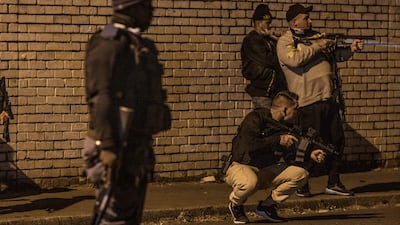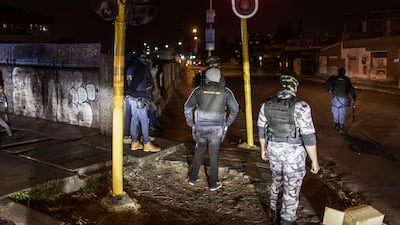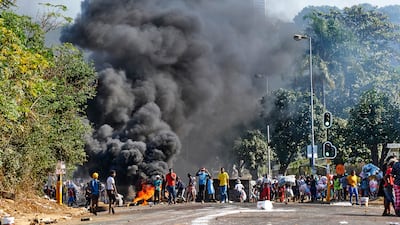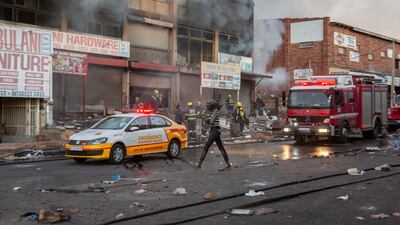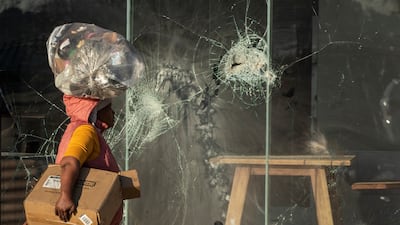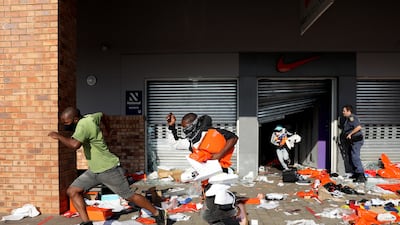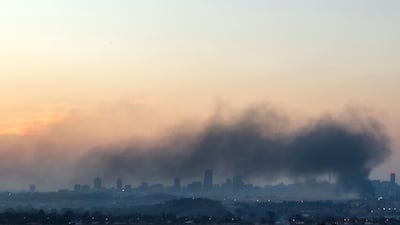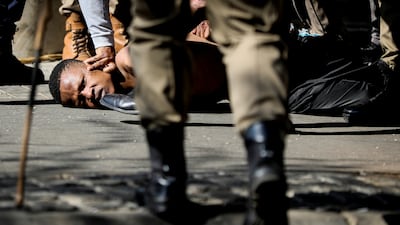At least 72 people have been killed in South Africa during riots in major cities across the country on Tuesday, after the jailing of former president Jacob Zuma in connection to corruption charges.
The 79-year-old former president was given a prison sentence last month after he failed to attend a hearing regarding allegations of abuse of office during his nine years in power.
President of South Africa
One of the most serious allegations relates to a $5 billion arms contract in the 1990s. Last week Zuma eventually turned himself in to authorities.
Protests by supporters and those opposed to the former leader soon turned into an eruption of anger at growing inequality in the country of almost 60 million.
Zuma’s home province of KwaZulu-Natal (KZN) was the site of the first outbreaks of violence, which quickly spread to South Africa's biggest city, Johannesburg in Gauteng province, and Durban, KZN's biggest city.
'Like a horror movie'
Tshidi Lethwane on Monday went to the Maponya Mall, just minutes from her home in Soweto. But a simple visit to the shopping centre to pick up her medication quickly turned into a harrowing experience.
“The looting started after I parked my car and entered the mall. I had to turn back; it was traumatic. I live 200 metres from the mall. There are gunshots even now, I can hear it from the house,” she told The National by telephone.
Ms Lethwane had not been in the building for five minutes when she noticed a disturbance in a homeware shop.
“People were running towards the shop to take whatever they could. It was a stampede, goods and people everywhere. It was a traumatic experience, like a scene from a horror movie.”
She feared for her safety and as Ms Lethwane quickly drove away, she saw that the shopping centre opposite the mall was also being looted.
“The Liquor City and butchery. People were running across the streets with alcohol and meat,” she said.
Hundreds of shops and businesses were ransacked in Gauteng and KZN, where Zuma’s most vocal supporters are based.
Among the scores killed in the unrest was a 15-year-old boy who was shot outside a supermarket in Pietermaritzburg in KZN, police said on Tuesday. More than 1,200 people have been arrested, while shops, petrol stations and government buildings were forced to close.
Last week, Zuma became the first former president of South Africa to be sent to prison, after months of trying to evade arrest.
The African National Congress veteran is a polarising figure, whose reign was littered with corruption charges, including some because of his links to the infamous Gupta family, who fled South Africa in 2016 after being accused of embezzling government funds.
Zuma resigned in February 2018 after a no-confidence motion in parliament.
Sharply growing inequality
Rioting erupted in KZN at the end of last week just after Zuma handed himself in to custody and then spread to Gauteng.
The former president’s family members have been encouraging the unrest on social media and the turmoil underscores divisions within the ruling ANC and the narrow political majority President Cyril Ramaphosa has over the party.
Zuma has consistently denied the corruption charges and said he is a victim of a political crackdown, while Mr Ramaphosa has said his predecessor cost the state more than R500 billion ($35 billion).
Police said the violence had intensified as Zuma challenged his prison term in South Africa’s top court, but much of the rioting is being fuelled by frustration over growing economic inequality and strict Covid-19 restrictions.
For the first three months of this year, national unemployment was at a record high of 32.6 per cent.
On Monday, the South African military issued a statement announcing that forces would be deployed in Gauteng and KwaZulu-Natal. The deployment of up to 2,500 troops is intended to quell the unrest and assist police and other law enforcement agencies to stop the violence spreading to other provinces.
Mr Ramaphosa gave a televised address to the nation on Monday night, where he denounced “opportunistic acts of criminality”.
“Let me be clear: we will take action to protect every person in this country against the threat of violence, intimidation, theft and looting,” he said.
“We will not hesitate to arrest and prosecute those who perpetrate these actions and will ensure that they face the full might of our law.” Mr Ramaphosa said if the violence was not contained, regional food and medicinal shortages could ensue.
Parts of Pietermaritzburg, in KZN, have become lawless, with a shopping centre going up in flames causing a huge plume of acrid smoke over the city.
Matthew Marwick, who lives close to the China Mall in the north-east of the city, was startled early on Tuesday by the unrest.
“I'd been awake since about 3am and I was lying down trying to rest my eyelids a bit at 7 o’clock when I heard what sounded like hundreds of rounds of gunfire going off. I went outside and that's when I saw black smoke billowing up from the China Mall,” Mr Marwick told The National by phone.
The smoke blanketed much of the city, with nearby shops being looted throughout the night, Mr Marwick said. He later drove through the city’s central business district.
“The entire CBD of Pietermaritzburg has been gutted. The length and the breadth of the CBD is in turmoil and it's been ransacked,” he said.
“There're parts of fridges and cupboards in the road, there are still hundreds of people milling around with their newly acquired possessions. It's quite heart-breaking to see.” He said he had not yet seen any army personnel in the vicinity.
Many businesses are affected and some have been destroyed. The Shoprite Group supermarket chain said it had been hit hard by the violence, having to suspend operations at dozens of its stores.
South Africa’s sluggish Covid-19 vaccine programme has also been affected by the violence, with hundreds of pharmacies, such as Clicks, which distribute inoculations, having to close until the violence subsides.
Clicks Group said in an email it has had to close 106 vaccination sites and 279 pharmacies, Bloomberg reported.
“Our vaccination programme has been severely disrupted just as it is gaining momentum,” President Ramaphosa said in his Monday address. “This will have lasting effects on our ability to consolidate some of the progress we were already witnessing in our economic recovery.”
State-administered inoculations have been suspended in KZN and parts of Gauteng, said Nicholas Crisp, a consultant to the National Health Department who is helping to oversee the programme.
Mr Marwick has lived primarily Pietermaritzburg since he was a child, including during the years of unrest in the early nineties before the end of apartheid.
“I was 22 at the time, which were very anxious times, but this is different. I have an even greater sense of anxiety right now.”
But, he said, he hopes the rioting will die down in a few days, because “there’s little left to loot”.
